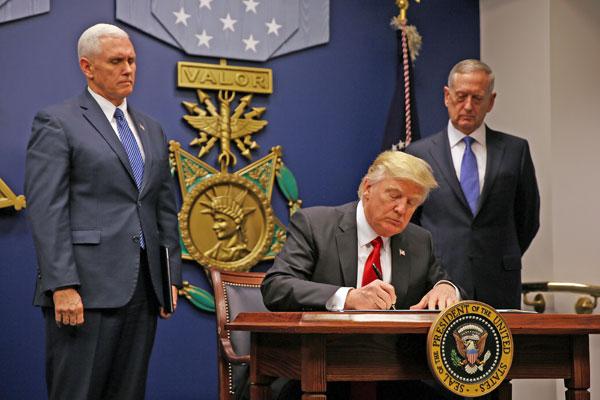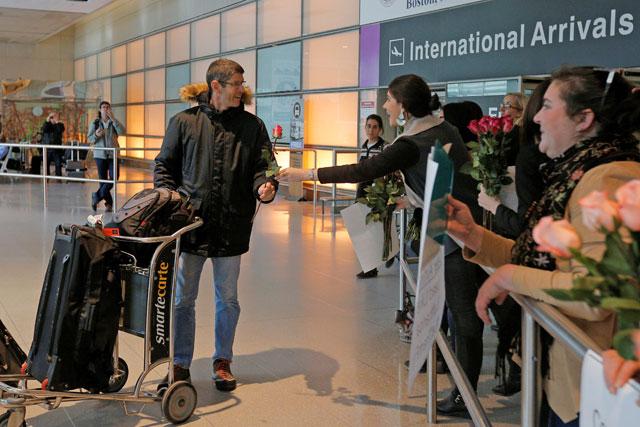You are here
Trump signs revised travel ban, exempts Iraqis
By AFP - Mar 06,2017 - Last updated at Mar 06,2017
WASHINGTON — US President Donald Trump on Monday signed a revised ban on travellers from six Muslim-majority nations, scaling back the order to exempt Iraqis and permanent US residents.
After his first wide-ranging and controversial restrictions were slapped down by the federal courts, Trump signed an order freezing new visas for Syrians, Iranians, Libyans, Somalis, Yemenis and Sudanese citizens.
The White House said Trump signed the order behind closed doors "this morning”. The measure is due to come into effect on March 16.
Secretary of State Rex Tillerson called the executive order "a vital measure for strengthening our national security”.
Attorney General Jeff Sessions added at a joint press conference that it "responsibly provides a needed pause so we can carefully review how we scrutinise people coming here from these countries of concern”.
"Three of these nations are state sponsors of terrorism," Sessions added, referring to Iran, Sudan and Syria, adding that others had served as "safe havens" for terror operatives.
The first version temporarily closed US borders to all refugees and to citizens from seven mainly Muslim countries.
The State Department initially cancelled 60,000 visas, and hundreds of people were reportedly detained at US airports.
The new order explicitly exempts Iraqis, legal permanent residents and valid visa holders.
Iraq's inclusion had risked scuttling cooperation between Baghdad and Washington in fighting the Daesh group.
The US and Iraqi militaries are currently fighting side-by-side in northern Iraq, trying to wrest the city of Mosul from the group control.
The Iraqi foreign ministry on Monday expressed its "deep satisfaction" with the new executive order, and described it as an "important step" in strengthening relations between Baghdad and Washington.
Take two
Trump's first order had sparked a legal, political and logistical furor.
There was chaos at major airports and mass protests while several district courts moved to block its implementation and lawmakers expressed opposition.
The troubled rollout also dominated the first weeks of his administration, leaving many with the impression that it was badly planned and badly implemented.
Trump has argued that the ban is needed to prevent Daesh and Al Qaeda militants from reaching US soil.
Polls show that American public opinion is deeply divided on the issue. Most indicate a slight majority of voters opposed, with strong support among Trump’s political base.
The Republican president criticised a court order suspending the ban as “a very bad decision, very bad for the safety and security of our country. The rollout was perfect”.
He vowed to challenge the matter in the courts, but appears to have eased away from that claim.
The new order is meant to address complaints raised by the federal judges that parts of the first version were unconstitutional.
But Democrats and organisations like the American Civil Liberties Union again voiced outrage.
“The only way to actually fix the Muslim ban is not to have a Muslim ban,” said Omar Jadwat, director of the ACLU’s Immigrant Rights Project.
“Instead, President Trump has recommitted himself to religious discrimination, and he can expect continued disapproval from both the courts and the people.”
Senate Democratic leader Chuck Schumer said the measure should be repealed, adding: “A watered down ban is still a ban.”
Travel slump
Whatever the legal outcome, Trump’s new ban is likely to polarise opinion further and be immensely popular with his hardcore of supporters.
The new order is also likely to sow further confusion about US immigration policies.
On Monday, Nigeria advised its citizens against all but essential travel to the United States, citing the lack of clarity on new immigration rules.
“In the last few weeks, the office has received a few cases of Nigerians with valid multiple-entry US visas being denied entry and sent back to Nigeria,” said special adviser to the president Abike Dabiri-Erewa.
According to travel data firm Forwardkeys, travel from the United States to the Middle East has also fallen sharply.
The firm said round trips to the United Arab Emirates were down 19 per cent and trips to Saudi Arabia were down 40 per cent in the month following the ban.
“Since imposition of the travel ban, Middle East markets have been the worst affected, with bookings for departure in the next three months falling 25.4 per cent behind the equivalent time last year,” the firm said in a report released Monday.
Roiled by Russia
But the ban is likely to help Trump divert attention from rolling crises on his ties with Russia.
The last week has seen his attorney general recuse himself from election-related investigations, after it emerged he met the Russian ambassador in Washington twice during the campaign.
It has also seen Trump level unsubstantiated allegations that former president Barack Obama ordered a wiretap on the now president’s phone.
Related Articles
NEW YORK/SAN FRANCISCO — The new, more narrowly tailored temporary travel ban President Donald Trump signed on Monday will be more difficult
BEIRUT/DAMASCUS/WASHINGTON — Citizens of seven mainly Muslim countries who were banned from the United States by President Donald Trump can
SAN FRANCISCO/WASHINGTON — A California-based federal appeals court on Monday dealt President Donald Trump another setback, refusing to revi

















